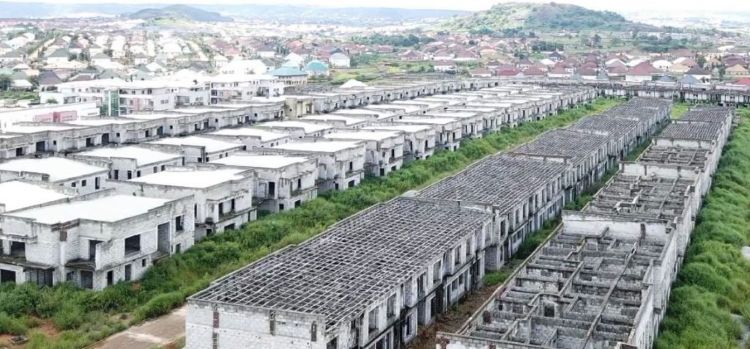EFCC Hands Over Emefiele’s Allegedly Forfeited 753-Unit Abuja Estate for Public Sale

In a move that signals a critical turning point in Nigeria’s fight against high-level financial crimes, the Economic and Financial Crimes Commission (EFCC) has formally handed over a massive 753-unit housing estate—allegedly traced to embattled former Central Bank of Nigeria (CBN) Governor, Godwin Emefiele—to the Federal Ministry of Housing and Urban Development for public sale.
The estate, located in a prime district within the Cadastral Zone of Abuja, was seized by the EFCC following a court-sanctioned forfeiture process. A Federal Capital Territory High Court in Apo had granted both interim and final forfeiture orders between December 2024 and early 2025.
The Ministry, led by Minister Ahmed Dangiwa, confirmed on Tuesday that it has officially taken possession of the property following a ceremonial handover at its Mabushi headquarters in Abuja.
Turning Looted Assets into Livable Homes
“This marks a significant milestone in our collective determination to ensure that recovered assets are put to productive use in ways that directly benefit the Nigerian people,” Dangiwa said in a statement released by the Ministry’s Director of Press and Public Relations, Salisu Haiba.
The Minister also revealed that the government will undertake a comprehensive integrity and structural audit of the estate to ensure the units meet safety and livability standards before offering them to the public.
“The housing units will be made available through a transparent, competitive sale process. This will include a nationwide advertisement and listing on the Renewed Hope Housing Portal, where interested Nigerians can submit their Expressions of Interest,” he said.
Some units, Dangiwa added, will also be reserved for special government housing needs—a clear indication that the estate will serve both social and revenue-generating functions.
EFCC’s New Chapter: From Recovery to Redistribution
For Olanipekun Olukoyede, Chairman of the EFCC, the moment was rich in both symbolism and substance.
“It is important for us to demonstrate to Nigerians that whatever proceeds of crime we recover will be applied transparently and in a manner that benefits the public,” Olukoyede declared during the handover.
“We will not allow looted assets to be looted again.”
His words echo a growing sentiment that asset recovery must go beyond headlines—it must translate into tangible socio-economic dividends for citizens, especially amid Nigeria’s severe housing deficit and economic hardship.
Emefiele’s Legal Troubles: A Broader Commentary on Elite Corruption
The real estate handover adds yet another chapter to the unraveling saga of Godwin Emefiele, who once presided over Nigeria’s apex bank and now stands trial for a slew of alleged financial offences. Emefiele’s fall from economic czar to criminal defendant underscores a broader reckoning with elite impunity in Nigeria.
Legal analysts note that while interim asset forfeitures have long been part of Nigeria’s anti-corruption toolkit, the actual reintegration of those assets into public use has often stalled due to bureaucratic inertia or lack of political will. This public sale—if executed with transparency—could serve as a test case for reform-minded governance.
BRANDECONOMY Insight: A Defining Moment or Another Missed Opportunity?
From a judicial and public policy perspective, this event is both a triumph and a trial. It marks one of the rare instances in Nigeria’s anti-corruption journey where asset forfeiture is followed by clear plans for redistribution in public interest.
But as experts caution, the true measure of success will lie in the implementation. Will the sale be truly open and corruption-free? Will proceeds be accounted for and reinvested in public housing and infrastructure?
As Nigeria continues to confront entrenched corruption, economic inequality, and institutional mistrust, turning symbols of excess into tools of inclusion may be the clearest route to restoring public faith.
Conclusion: A House Divided, Now Reclaimed
The 753 housing units allegedly acquired through unlawful enrichment by a former steward of the national treasury are now poised to become homes for law-abiding citizens. That is both poetic justice and policy progress.
Whether this marks the beginning of a more robust asset recovery framework or remains a one-off gesture will depend on transparency, legal follow-through, and sustained political commitment.
Stay with BRANDECONOMY as we continue to track the legal, policy, and economic implications of Nigeria’s most high-profile corruption cases—and how they reshape the landscape for governance, business, and justice.











